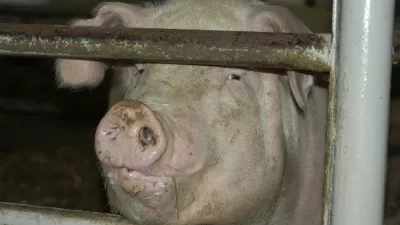Preserving farmland has always been a major issue in the U.S. But as Bill Fulton discusses, the local economic results don't quite justify the efforts.
"The longtime farmers say they're losing money. Even the organic farmers, who are making money, fear that proximity to urban development - and the complaints that arise - will drive them out of business. The farmland is worth far, far more for development than for farming. So why save it? Is there an economic development purpose to farmland preservation?"
"This debate is being played out in counties all across America. As an economic development strategy, agriculture usually looks like a loser. It consumes enormous amounts of land, which is far more valuable in the marketplace if it is used for something else. It employs few people, often on a seasonal basis and at very low wages. And it creates low value-added products."
"Still, farmland preservation is a strong state or local policy in many locations. The arguments in favor are almost never economic in nature. Rather, local residents often favor farmland protection over subdivision development because they think it will reduce traffic and maintain their community's traditional lifestyle even though they often complain about the noise and smells from farm operations. Environmentalists argue that organic farming can be economically successful because of farmers' markets and community-supported agriculture, a new trend in which local residents contract with local farmers for food."
FULL STORY: Down on the Farm

Planetizen Federal Action Tracker
A weekly monitor of how Trump’s orders and actions are impacting planners and planning in America.

Map: Where Senate Republicans Want to Sell Your Public Lands
For public land advocates, the Senate Republicans’ proposal to sell millions of acres of public land in the West is “the biggest fight of their careers.”

Restaurant Patios Were a Pandemic Win — Why Were They so Hard to Keep?
Social distancing requirements and changes in travel patterns prompted cities to pilot new uses for street and sidewalk space. Then it got complicated.

DC Area County Eliminates Bus Fares
Montgomery County joins a growing trend of making transit free.

Platform Pilsner: Vancouver Transit Agency Releases... a Beer?
TransLink will receive a portion of every sale of the four-pack.

Toronto Weighs Cheaper Transit, Parking Hikes for Major Events
Special event rates would take effect during large festivals, sports games and concerts to ‘discourage driving, manage congestion and free up space for transit.”
Urban Design for Planners 1: Software Tools
This six-course series explores essential urban design concepts using open source software and equips planners with the tools they need to participate fully in the urban design process.
Planning for Universal Design
Learn the tools for implementing Universal Design in planning regulations.
Heyer Gruel & Associates PA
JM Goldson LLC
Custer County Colorado
City of Camden Redevelopment Agency
City of Astoria
Transportation Research & Education Center (TREC) at Portland State University
Camden Redevelopment Agency
City of Claremont
Municipality of Princeton (NJ)





























